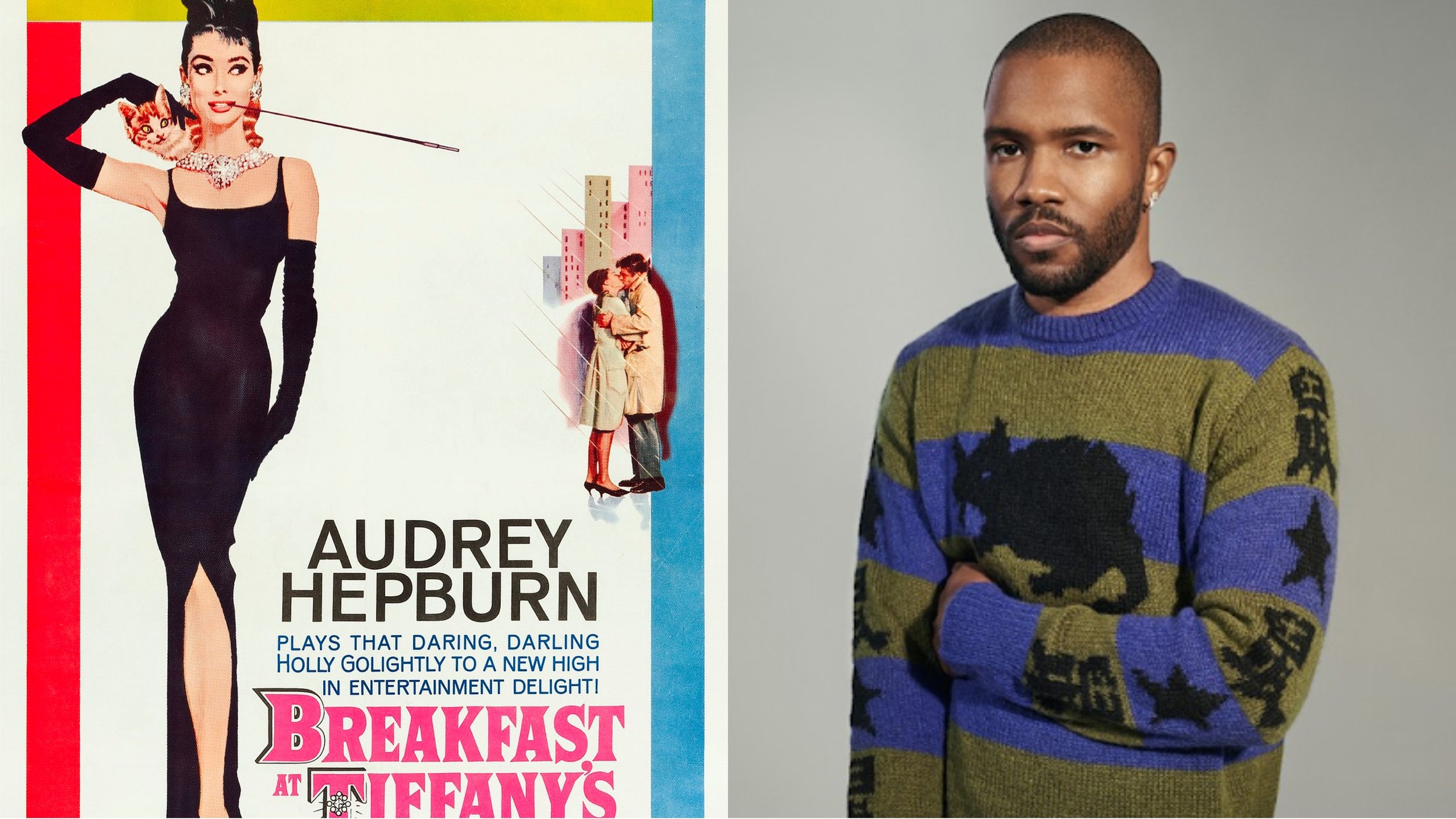Cover Story: Frank Ocean’s Emotional Rendition of 'Moon River' Encapsulates Societal Loneliness
Strummed from the window sill of “a very lovely, very frightened girl,” the revived Breakfast at Tiffany’s classic continues to touch isolated hearts over half a century later.
Written by Deborah Hill
Image courtesy of Paramount Pictures and photo courtesy of Collier Schorr
Stapled into modern minds as a romantic wedding ballad, the 1961 original “Moon River” by Henry Mancini and John Mercer survives its composers as a longing for love. Soft, subtle, and sweet, the gem first floated into the world as a glimpse of hidden desire underneath Holly Golightly’s glamorous social life in the classic film Breakfast at Tiffany’s. Many have reimagined Hepburn’s original recording, including Frank Sinatra, Aretha Franklin, and The Killers, continuing to enchant generations of fans with each new version, but none accomplish what Frank Ocean does in his pained rendition of the song.
Hepburn’s character portrays herself as vain and haughty to get what she wants from the men around her: an easy, luxurious life, gifted through high-profile dates and casual relationships. She is crass and pessimistic — looking to serve only her needs and rejecting delusions of a full life. Still, Hepburn exemplifies on screen what the young women of the ‘60s aspired to have, the fierce independence that inspires a break from domesticity. And yet, the guitar performance of “Moon River” has Golightly reaching the opposite way, vying for a life of peace and familiarity.
It’s fitting then, that Hepburn’s performance is stripped down to its bones. She whispers out the first of the quiet lyrics, “Moon river, wider than a mile / I'm crossing you in style someday” as she stares outside of her window, looking over Manhattan. The slow strum of her guitar carries the melody out for only a second, plucking out harmonious chords and brushing over the intimacy of a visual scene representing tranquil simplicity. Ultimately, the original becomes a hum for the comfort of everlasting love “Waiting around the bend.”
In comparison, Ocean’s synth-heavy and reverbed interpretation longs for something more intense and intrinsic. Released on Valentine’s Day in 2018, two years after his sophomore studio album Blonde, Ocean took to Tumblr and YouTube to surprise fans with his applied genius on the melancholy classic. In response, fans wondered what Ocean was trying to say with the elusive release, and if the studio time meant another project was soon to be out. The instrumentalist had been known to ebb and flow out of the industry spotlight since the start of his career in 2011, going between periods of consistent performance and cold absence. After the release of Blonde, however, it seemed the singer intended to stay in isolation. This made his reimaged version of “Moon River” all the more layered. With updated lyrics, Ocean explores the isolation he chases, allowing himself to feel torn between it and the publicity of his life.
Ocean opens the song with childlike autotuned vocals carrying the tune, responding to the warmth of his regular baritone as the chords swell underneath. The song then becomes a conversation between Ocean and a younger, more naive version of himself. As his youthful self romanticizes a fantasy of “Two drifters off to see the world,” the older Ocean paints the reality of things, warning “There’s such a crazy world you’ll see / We’re all chasin’ after our ends.”
Later, Ocean changes the line “Oh, dream maker / You heartbreaker,” to “My dream maker / Heartbreaker,” effectively shifting the blame from a heartbreak caused by someone else to one caused by an internal source of his own pain: his head. This lyric seems to point to a new place of understanding for the Long Beach native. It recognizes the double-edged sword of his genius, with a successful music career on one side and the loss of authentic connection on the other.
As a result, Ocean’s version marks a generational turning point. His change of lyrics touches on the mental struggle of living in a world filled with curiosities to chase, and how the intrigue of adventure can be broken through with the light of reality. The R&B singer sits privy to the illusion at a grander scale, being a part of the elusive music industry. With that, his rendition of Hepburn’s ballad serves not only as a voice for the lonely in everyday life but also for Ocean’s own turmoil, connecting him to fans through the power of his art. The intensity of that connection transforms “Moon River,” marking a turning point in its use as escapism, and revitalizing the scene of a “Moon river, wider than the mile.”

